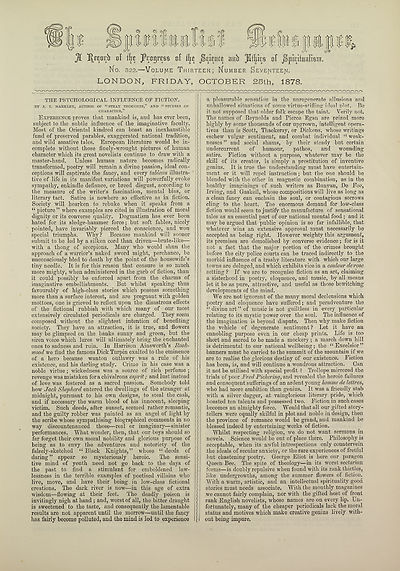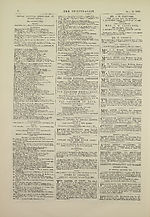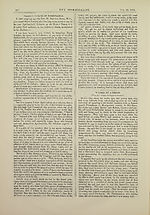Download files
Complete book:
Individual page:
Thumbnail gallery: Grid view | List view

<y
S)
€W^
II
i,
in
fit ol % yfujrfss ul i|f ^ftftttf mtit of ^jttftl«aE$nt,
No. 322.—Volume Thirteen; Kumber Seve^teej'i.
LONDON, FRIDAY, OCTOBER 2Bth, 1878.
THE PSYCHOLOGICAL INFLUENCE OF FICTION.
BY J. T. MARK LEY, AUTHOR OP “ STRAY THOUGHTS,” AND STUDIES OP [;
CHARACTER.”
Experience proves that mankind is, and has ever been, I
subject to the subtle influence of the imaginative faculty, i
Most of the Oriental kindred can boast an inexhaustible
fund of preserved parables, exaggerated national tradition,
and wild amative tales. European literature would be in- j
complete without those finely-wrought pictures of human j
character which its great novelists continue to draw with a
master-hand. Unless human nature becomes radically I:
transformed, poetry will remain a divine passion, ideal con¬
ceptions will captivate the fancy, and every tableau illustra- * j
tive of life in its manifest variations will powerfully evoke I
sympathy, enkindle defiance, or breed disgust, according to j
the measure of the writer’s fascination, mental bias, or [
literary tact. Satire is nowhere so effective as in fiction.
Society will hearken to rebuke when it speaks from a j
“ picture ” where examples are cited in illustration of moral |
dignity or its converse quality. Dogmatism has ever been I
hated for its sledge-hammer force; but soft fables, nicely
pointed, have invariably pierced the conscience, and won |
special triumphs. Why? Because mankind will sooner |
submit to be led by a silken cord than driven—brute-like— !
with a thong of scorpions. Many who would shun the i
approach of a warrior’s naked sword might, perchance, be j
unconsciously bled to death by the point of the housewife’s
tiny needle. It is for this reason that censure is so much j
more mighty, when administered in the garb of fiction, than
it could possibly be enforced apart from the charms of |
imaginative embellishments. But whilst speaking thus j
favourably of high-class stories which possess something
more than a surface interest, and are pregnant with golden j
mottoes, one is grieved to reflect upon the disastrous effects
of the fictional rubbish with which many of our most j
extensively circulated periodicals are charged. They seem I
composed without the slightest intention of benefiting j
society. They have an attraction, it is true, and flowers j
may be glimpsed on the banks sunny and green, but the j
siren voice which lures will ultimately bring the enchanted
ones to sadness and ruin. In Harrison Ainsworth’s Rook- \
wood we find the famous Dick Turpin exalted to the eminence
of a hero because wanton outlawry was a rule of his j
existence, and his darling study. Crime in his case was a i
noble virtue ; wickedness was a source of rich perfume ; j
revenge was mistaken for a chivalrous esprit; and lust instead j
of love was fostered as a sacred passion. Somebody told j
how Jack Shepherd entered the dwellings of the stranger at |
midnight, pursuant to his own designs, to steal the cash, j
and if necessary the warm blood of his innocent, sleeping j
victim. Such deeds, after sunset, seemed rather romantic, j
and the guilty robber was painted as an angel of light by
the scribe whose sympathising biographical comments in no j
way discountenanced those—real or imaginary—sinister |
performances. What wonder, then, that our boys should so j
far forget their own moral nobility and glorious purpose of j
being as to envy the adventures and notoriety of the
falsely-sketched <c Black Knights,” whose “deeds of j
daring” appear so mysteriously heroic. The sensi- j
tive mind of youth need not go back to the days of j
the past to find a stimulant for emboldened law- j
lessness in the terrible examples of poetised villains who’ I
live, move, and have their being in low-class fictional j
creations. The dark river is now—in this age of extra |
wisdom—flowing at their feet. The deadly poison is I
invitingly nigh at hand ; and, worst of all, the bitter draught j
is sweetened to the taste, and consequently the lamentable j \
results are not apparent until the morrow—until the fancy | <
has fairly become polluted, and the mind is led to experience 11
j a pleasurable sensation in the unregenerate allusions and
| unhallowed situations of some virtue-stifling ideal plot. Be
it not supposed that older folk escape the taint. Verily not.
| The names of Reynolds and Pierce Egan are prized more
highly by some thousands of our upgrown, intelligent opera-
| tives than is Scott, Thackeray, or Dickens, whose writings
eschew vulgar sentiment, and combat individual M weak-
j nesses ” and social shams, by their steady but certain
undercurrent of humour, pathos, and wounding
satire. Fiction without a purpose, whatever may be the
skill of its creator, is simply a prostitution of inventive
| genius. It is true the understanding must have entertain¬
ment or it will repel instruction; but the one should be
| blended with the other in magnetic combination, as in the
healthy imaginings of such writers as Bunyan, De Foe,
| Irving, and Gaskell, whose compositions will live as long as
I a clean fancy can enchain the soul, or contagious sorrows
| cling to the heart. The enormous demand for low-class
fiction would seem to justify the manufacture of sensational
tales as an essential part of our national mental food ; and it
may be argued that public opinion is so far infallible, that
whatever wins an extensive approval must necessarily be
accepted as being right. However weighty this argument,
its premises are demolished by converse evidence; for is it
! not a fact that the major portion of the crimes brought
; | before the city police courts can be traced indirectly to the
morbid influence of a trashy literature with which our large
! towns are deluged, and which exhibits vice in a couleur de rose
setting ? If we are to recognise fiction as an art, claiming
I a sisterhood in poetry, eloquence, and music, by all means
j let it be as pure, attractive, and useful as those bewitching
| developments of the mind.
We are not ignorant of the many moral declensions which
poetry and eloquence have suffered; and peradventure the
' “ divine art ” of music is not guiltless in every particular
> | relating to its mystic power over the soul. The influence of
! I the imagination is beyond dispute. Then why make fiction
| the vehicle of degenerate sentiment ? Let it have an
] ennobling purpose even in our cheap prints. Life is too
short and sacred to be made a mockery ; a march down hill
I is detrimental to our national wellbeing: the “ Excelsior ”
banners must be carried to the summit of the mountain if we
j are to realise the glorious destiny of our existence. Fiction
I has been, is, and will continue a wondrous attraction. Can
it not be utilised with special profit ? Trollope mirrored the
trials of poor Fred Pickering, revealed the heroic failures
i and consequent sufferings of an ardent young homme de lettres,
who had more ambition than genius. It was a friendly stab
with a silver dagger, at vainglorious literary pride, which
; i boasted ten talents and possessed two. Fiction in such cases
becomes an almighty force. Would that all our gifted story¬
tellers were equally skilful in plot and noble in design, then
II the province of romance would be grand, and mankind be
11 blessed indeed by entertaining works of fiction.
Whilst respecting religion, we do not want sermons in
novels. Science would be out of place there. Philosophy is
acceptable, when its awful introspections only countervein
the ideals of secular anxiety, or the rare experiences of fretful
I but chastening poetry. George Eliot is here our paragon
Queen Bee. The spite of theology—in its worst sectarian
I forms—is doubly repulsive when found with its rank thistles,
like undergrowths, among the summer flowers of fiction,
j With a warm, artistic, and an intellectual spirituality good
j stories must needs associate. With the monthly magazines
we cannot fairly complain, nor with the gifted host of front
I rank English novelists, whose names are on every lip. Un-
I fortunately, many of the cheaper periodicals lack the moral
| status and motives which make creative genius lively with-
I out being impure.
S)
€W^
II
i,
in
fit ol % yfujrfss ul i|f ^ftftttf mtit of ^jttftl«aE$nt,
No. 322.—Volume Thirteen; Kumber Seve^teej'i.
LONDON, FRIDAY, OCTOBER 2Bth, 1878.
THE PSYCHOLOGICAL INFLUENCE OF FICTION.
BY J. T. MARK LEY, AUTHOR OP “ STRAY THOUGHTS,” AND STUDIES OP [;
CHARACTER.”
Experience proves that mankind is, and has ever been, I
subject to the subtle influence of the imaginative faculty, i
Most of the Oriental kindred can boast an inexhaustible
fund of preserved parables, exaggerated national tradition,
and wild amative tales. European literature would be in- j
complete without those finely-wrought pictures of human j
character which its great novelists continue to draw with a
master-hand. Unless human nature becomes radically I:
transformed, poetry will remain a divine passion, ideal con¬
ceptions will captivate the fancy, and every tableau illustra- * j
tive of life in its manifest variations will powerfully evoke I
sympathy, enkindle defiance, or breed disgust, according to j
the measure of the writer’s fascination, mental bias, or [
literary tact. Satire is nowhere so effective as in fiction.
Society will hearken to rebuke when it speaks from a j
“ picture ” where examples are cited in illustration of moral |
dignity or its converse quality. Dogmatism has ever been I
hated for its sledge-hammer force; but soft fables, nicely
pointed, have invariably pierced the conscience, and won |
special triumphs. Why? Because mankind will sooner |
submit to be led by a silken cord than driven—brute-like— !
with a thong of scorpions. Many who would shun the i
approach of a warrior’s naked sword might, perchance, be j
unconsciously bled to death by the point of the housewife’s
tiny needle. It is for this reason that censure is so much j
more mighty, when administered in the garb of fiction, than
it could possibly be enforced apart from the charms of |
imaginative embellishments. But whilst speaking thus j
favourably of high-class stories which possess something
more than a surface interest, and are pregnant with golden j
mottoes, one is grieved to reflect upon the disastrous effects
of the fictional rubbish with which many of our most j
extensively circulated periodicals are charged. They seem I
composed without the slightest intention of benefiting j
society. They have an attraction, it is true, and flowers j
may be glimpsed on the banks sunny and green, but the j
siren voice which lures will ultimately bring the enchanted
ones to sadness and ruin. In Harrison Ainsworth’s Rook- \
wood we find the famous Dick Turpin exalted to the eminence
of a hero because wanton outlawry was a rule of his j
existence, and his darling study. Crime in his case was a i
noble virtue ; wickedness was a source of rich perfume ; j
revenge was mistaken for a chivalrous esprit; and lust instead j
of love was fostered as a sacred passion. Somebody told j
how Jack Shepherd entered the dwellings of the stranger at |
midnight, pursuant to his own designs, to steal the cash, j
and if necessary the warm blood of his innocent, sleeping j
victim. Such deeds, after sunset, seemed rather romantic, j
and the guilty robber was painted as an angel of light by
the scribe whose sympathising biographical comments in no j
way discountenanced those—real or imaginary—sinister |
performances. What wonder, then, that our boys should so j
far forget their own moral nobility and glorious purpose of j
being as to envy the adventures and notoriety of the
falsely-sketched <c Black Knights,” whose “deeds of j
daring” appear so mysteriously heroic. The sensi- j
tive mind of youth need not go back to the days of j
the past to find a stimulant for emboldened law- j
lessness in the terrible examples of poetised villains who’ I
live, move, and have their being in low-class fictional j
creations. The dark river is now—in this age of extra |
wisdom—flowing at their feet. The deadly poison is I
invitingly nigh at hand ; and, worst of all, the bitter draught j
is sweetened to the taste, and consequently the lamentable j \
results are not apparent until the morrow—until the fancy | <
has fairly become polluted, and the mind is led to experience 11
j a pleasurable sensation in the unregenerate allusions and
| unhallowed situations of some virtue-stifling ideal plot. Be
it not supposed that older folk escape the taint. Verily not.
| The names of Reynolds and Pierce Egan are prized more
highly by some thousands of our upgrown, intelligent opera-
| tives than is Scott, Thackeray, or Dickens, whose writings
eschew vulgar sentiment, and combat individual M weak-
j nesses ” and social shams, by their steady but certain
undercurrent of humour, pathos, and wounding
satire. Fiction without a purpose, whatever may be the
skill of its creator, is simply a prostitution of inventive
| genius. It is true the understanding must have entertain¬
ment or it will repel instruction; but the one should be
| blended with the other in magnetic combination, as in the
healthy imaginings of such writers as Bunyan, De Foe,
| Irving, and Gaskell, whose compositions will live as long as
I a clean fancy can enchain the soul, or contagious sorrows
| cling to the heart. The enormous demand for low-class
fiction would seem to justify the manufacture of sensational
tales as an essential part of our national mental food ; and it
may be argued that public opinion is so far infallible, that
whatever wins an extensive approval must necessarily be
accepted as being right. However weighty this argument,
its premises are demolished by converse evidence; for is it
! not a fact that the major portion of the crimes brought
; | before the city police courts can be traced indirectly to the
morbid influence of a trashy literature with which our large
! towns are deluged, and which exhibits vice in a couleur de rose
setting ? If we are to recognise fiction as an art, claiming
I a sisterhood in poetry, eloquence, and music, by all means
j let it be as pure, attractive, and useful as those bewitching
| developments of the mind.
We are not ignorant of the many moral declensions which
poetry and eloquence have suffered; and peradventure the
' “ divine art ” of music is not guiltless in every particular
> | relating to its mystic power over the soul. The influence of
! I the imagination is beyond dispute. Then why make fiction
| the vehicle of degenerate sentiment ? Let it have an
] ennobling purpose even in our cheap prints. Life is too
short and sacred to be made a mockery ; a march down hill
I is detrimental to our national wellbeing: the “ Excelsior ”
banners must be carried to the summit of the mountain if we
j are to realise the glorious destiny of our existence. Fiction
I has been, is, and will continue a wondrous attraction. Can
it not be utilised with special profit ? Trollope mirrored the
trials of poor Fred Pickering, revealed the heroic failures
i and consequent sufferings of an ardent young homme de lettres,
who had more ambition than genius. It was a friendly stab
with a silver dagger, at vainglorious literary pride, which
; i boasted ten talents and possessed two. Fiction in such cases
becomes an almighty force. Would that all our gifted story¬
tellers were equally skilful in plot and noble in design, then
II the province of romance would be grand, and mankind be
11 blessed indeed by entertaining works of fiction.
Whilst respecting religion, we do not want sermons in
novels. Science would be out of place there. Philosophy is
acceptable, when its awful introspections only countervein
the ideals of secular anxiety, or the rare experiences of fretful
I but chastening poetry. George Eliot is here our paragon
Queen Bee. The spite of theology—in its worst sectarian
I forms—is doubly repulsive when found with its rank thistles,
like undergrowths, among the summer flowers of fiction,
j With a warm, artistic, and an intellectual spirituality good
j stories must needs associate. With the monthly magazines
we cannot fairly complain, nor with the gifted host of front
I rank English novelists, whose names are on every lip. Un-
I fortunately, many of the cheaper periodicals lack the moral
| status and motives which make creative genius lively with-
I out being impure.
Set display mode to:
![]() Universal Viewer |
Universal Viewer | ![]() Mirador |
Large image | Transcription
Mirador |
Large image | Transcription
Images and transcriptions on this page, including medium image downloads, may be used under the Creative Commons Attribution 4.0 International Licence unless otherwise stated. ![]()
| The Spiritualist > The Spiritualist newspaper > No.322, October 25th 1878 > (3) |
|---|
| Permanent URL | https://digital.nls.uk/137221842 |
|---|
| Attribution and copyright: |
|
|---|---|
| Shelfmark | P.20 |
|---|---|
| Additional NLS resources: |

